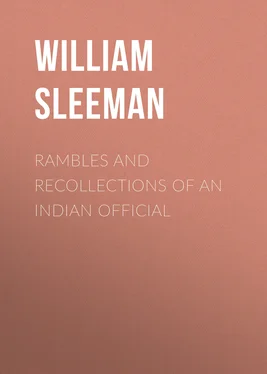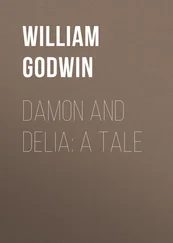William Sleeman - Rambles and Recollections of an Indian Official
Здесь есть возможность читать онлайн «William Sleeman - Rambles and Recollections of an Indian Official» — ознакомительный отрывок электронной книги совершенно бесплатно, а после прочтения отрывка купить полную версию. В некоторых случаях можно слушать аудио, скачать через торрент в формате fb2 и присутствует краткое содержание. Жанр: Путешествия и география, История, foreign_edu, foreign_antique, foreign_prose, на английском языке. Описание произведения, (предисловие) а так же отзывы посетителей доступны на портале библиотеки ЛибКат.
- Название:Rambles and Recollections of an Indian Official
- Автор:
- Жанр:
- Год:неизвестен
- ISBN:нет данных
- Рейтинг книги:4 / 5. Голосов: 1
-
Избранное:Добавить в избранное
- Отзывы:
-
Ваша оценка:
- 80
- 1
- 2
- 3
- 4
- 5
Rambles and Recollections of an Indian Official: краткое содержание, описание и аннотация
Предлагаем к чтению аннотацию, описание, краткое содержание или предисловие (зависит от того, что написал сам автор книги «Rambles and Recollections of an Indian Official»). Если вы не нашли необходимую информацию о книге — напишите в комментариях, мы постараемся отыскать её.
Rambles and Recollections of an Indian Official — читать онлайн ознакомительный отрывок
Ниже представлен текст книги, разбитый по страницам. Система сохранения места последней прочитанной страницы, позволяет с удобством читать онлайн бесплатно книгу «Rambles and Recollections of an Indian Official», без необходимости каждый раз заново искать на чём Вы остановились. Поставьте закладку, и сможете в любой момент перейти на страницу, на которой закончили чтение.
Интервал:
Закладка:
At last, in the year 1833, a very holy Brahman, who lived in his cloister near the iron suspension bridge over the Biās river, ten miles from Sāgar, sat down with a determination to wrestle with the Deity till he should be compelled to reveal to him the real cause of all these calamities of season under which the people were groaning. 385After three days and nights of fasting and prayer, he saw a vision which stood before him in a white mantle, and told him that all these calamities arose from the slaughter of cows; and that under former Governments this practice had been strictly prohibited, and the returns of the harvest had, in consequence, been always abundant, and subsistence cheap, in spite of invasion from without, insurrection within, and a good deal of misrule and oppression on the part of the local government. The holy man was enjoined by the vision to make this revelation known to the constituted authorities, and to persuade the people generally throughout the district to join in the petition for the prohibition of beef-eating throughout our Nerbudda territories. He got a good many of the most respectable of the landholders around him, and explained the wishes of the vision of the preceding night. A petition was soon drawn up and signed by many hundreds of the most respectable people in the district, and presented to the Governor-General's representative in these parts, Mr. F. C. Smith. Others were presented to the civil authorities of the district, and all stating in the most respectful terms how sensible the people were of the inestimable benefits of our rule, and how grateful they all felt for the protection to life and property, and to the free employment of all their advantages, which they had under it; and for the frequent and large reduction in the assessments, and remission in the demand, on account of calamities of seasons. These, they stated, were all that Government could do to relieve a suffering people, but they had all proved unavailing; and yet, under this truly paternal rule, the people were suffering more than under any former Government in its worst period of misrule—the hand of an incensed God was upon them; and, as they had now, at last after many fruitless attempts, discovered the real cause of this anger of the Deity, they trusted that we would listen to their prayers, and restore plenty and all its blessings to the country by prohibiting the eating of beef . All these dreadful evils had, they said, unquestionably originated in the (Sadr Bāzār) great market of the cantonments, where, for the first time, within one hundred miles of the sacred stream of the Nerbudda, men had purchased and eaten cows' flesh.
These people were all much attached to us and to our rule, and were many of them on the most intimate terms of social intercourse with us; and, at the time they signed this petition, were entirely satisfied that they had discovered the real cause of all their sufferings, and impressed with the idea that we should be convinced, and grant their prayers. 386The day is past. Beef continued to be eaten with undiminished appetite, the blight, nevertheless, disappeared, and every other sign of vengeance from above; and the people are now, I believe, satisfied that they were mistaken. They still think that the lands do not yield so many returns of the seed under us as under former rulers; that they have lost some of the barkat (blessings) which they enjoyed under them—they know not why. The fact is that under us the lands do not enjoy the salutary fallows which frequent invasions and civil wars used to cause under former Governments. Those who survived such civil wars and invasions got better returns for their seed.
During the discussion of the question with the people, I had one day a conversation with the Sadr Amīn, or head native judicial officer, whom I have already mentioned. He told me that 'there could be no doubt of the truth of the conclusion to which the people had at length come. 'There are', he said, 'some countries in which punishments follow crimes after long intervals, and, indeed, do not take place till some future birth; in others, they follow crimes immediately; and such is the country bordering the stream of Mother Nerbudda . This', said he, 'is a stream more holy than that of the great Ganges herself, since no man is supposed to derive any benefit from that stream unless he either bathe in it or drink from it; but the sight of the Nerbudda from a distant hill could bless him, and purify him. In other countries, the slaughter of cows and bullocks might not be punished for ages; and the harvest, in such countries, might continue good through many successive generations under such enormities; indeed, he was not quite sure that there might not be countries in which no punishment at all would inevitably follow; but, so near the Nerbudda, this could not be the case. 387Providence could never suffer beef to be eaten so near her sacred majesty without visiting the crops with blight, hail, or some other calamity, and the people with cholera morbus, small-pox, and other great pestilences. As for himself, he should never be persuaded that all these afflictions did not arise wholly and solely from this dreadful habit of eating beef. I declare', concluded he, 'that if the Government would but consent to prohibit the eating of beef, it might levy from the lands three times the revenue that they now pay.'
The great festival of the Holī, the Saturnalia of India, terminates on the last day of Phālgun, or 16th of March. 388On that day the Holī is burned; and on that day the ravages of the monster (for monster they will have it to be) are supposed to cease. Any field that has remained untouched up to that time is considered to be quite secure from the moment the Holī has been committed to the flames. What gave rise to the notion I have never been able to discover, but such is the general belief. I suppose the siliceous epidermis must then have become too hard, and the pores in the stem too much closed up to admit of the further depredation of the fungi.
In the latter end of 1831, while I was at Sāgar, a cowherd in driving his cattle to water at a reach of the Biās river, called the Nardhardhār, near the little village of Jasrathī, was reported to have seen a vision that told him the waters of that reach, taken up and conveyed to the fields in pitchers, would effectually keep off the blight from the wheat, provided the pitchers were not suffered to touch the ground on the way. On reaching the field, a small hole was to be made in the bottom of the pitcher, so as to keep up a small but steady stream, as the bearer carried it round the borders of the field, that the water might fall in a complete ring, except at a small opening—which was to be kept dry, in order that the monster or demon blight might make his escape through it, not being able to cross over any part watered by the holy stream. The waters Of the Bias river generally are not supposed to have any peculiar virtues. The report of this vision spread rapidly over the country; and the people who had been suffering under so many seasons of great calamity were anxious to try anything that promised the slightest chance of relief. Every cultivator of the district prepared pots for the conveyance of the water, with tripods to support them while they rested on the road, that they might not touch the ground. The spot pointed out for taking the water was immediately under a fine large pīpal- tree 389which had fallen into the river, and on each bank was seated a Bairāgī, or priest of Vishnu. The blight began to manifest itself in the alsī (linseed) in January, 1832, but the wheat is never considered to be in danger till late in February, when it is nearly ripe; and during that month and the following the banks of the river were crowded with people in search of the water. Some of the people came more than one hundred miles to fetch it, and all seemed quite sure that the holy water would save them. Each person gave the Bairāgī priest of his own side of the river two half-pence (copper pice), two pice weight of ghī (clarified butter), and two pounds of flour, before he filled his pitcher, to secure his blessings from it. These priests were strangers, and the offerings were entirely voluntary. The roads from this reach of the Bias river, up to the capital of the Orchhā Rājā, more than a hundred miles, were literally lined with these water-carriers; and I estimated the number of persons who passed with the water every day for six weeks at ten thousand a day. 390After they had ceased to take the water, the banks were long crowded with people who flocked to see the place where priests and waters had worked such miracles, and to try and discover the source whence the water derived its virtues. It was remarked by some that the pīpal-tree, which had fallen from the bank above many years before, had still continued to throw out the richest foliage from the branches above the surface of the water. Others declared that they saw a monkey on the bank near the spot, which no sooner perceived it was observed than it plunged into the stream and disappeared. Others again saw some flights of steps under the water, indicating that it had in days of yore been the site of a temple, whose god, no doubt, gave to the waters the wonderful virtues it had been found to possess. The priests would say nothing but that 'it was the work of God, and, like all his works, beyond the reach of man's understanding.' They made their fortunes, and got up the vision and miracle, no doubt, for that especial purpose. 391As to the effect, I was told by hundreds of farmers who had tried the waters that, though it had not anywhere kept the blight entirely off from the wheat, it was found that the fields which had not the advantages of water were entirely destroyed; and, where the pot had been taken all round the field without leaving any dry opening for the demon to escape through, it was almost as bad; but, when a small opening had been left, and the water carefully dropped around the field elsewhere, the crops had been very little injured; which showed clearly the efficacy of the water, when all the ceremonies and observances prescribed by the vision had been attended to.
Читать дальшеИнтервал:
Закладка:
Похожие книги на «Rambles and Recollections of an Indian Official»
Представляем Вашему вниманию похожие книги на «Rambles and Recollections of an Indian Official» списком для выбора. Мы отобрали схожую по названию и смыслу литературу в надежде предоставить читателям больше вариантов отыскать новые, интересные, ещё непрочитанные произведения.
Обсуждение, отзывы о книге «Rambles and Recollections of an Indian Official» и просто собственные мнения читателей. Оставьте ваши комментарии, напишите, что Вы думаете о произведении, его смысле или главных героях. Укажите что конкретно понравилось, а что нет, и почему Вы так считаете.












